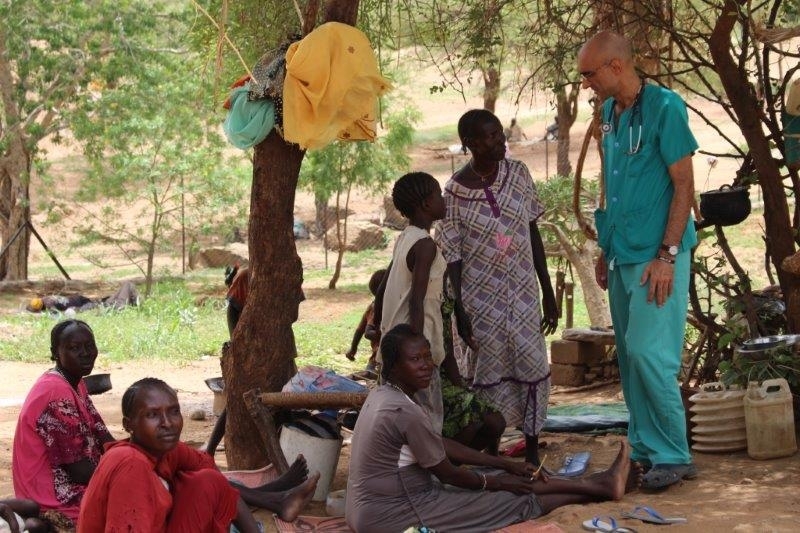As the sole doctor permanently based in Sudan’s Nuba Mountains, home to 750,000 people, Dr. Tom Catena has worked around the clock to care for the citizens of this war-torn area. Amid ongoing civil war between the Government of Sudan and the Sudanese People’s Liberation Movement, Dr. Catena has saved countless lives at the Mother of Mercy Catholic Hospital – the only fully functioning hospital in the region.
In the years since war broke out, Dr. Tom Catena – known to locals as Dr. Tom – has worked tirelessly to address the horrors of war. Removing shrapnel, amputating limbs and delivering babies as bombs rain down has become the norm for a man who first came to the region in peacetime, sent by the Catholic Medical Mission Board (CMMB).
When the war first started, he was encouraged to evacuate, but he insisted on staying. “I’ve never regretted that decision,” says Dr. Catena. “I was needed at that point more than ever. I couldn’t just abandon the people I had gotten to know just as they needed support the most. Because it’s the people that count here. What they do never ceases to amaze me.”
Violence spread and those living in the region suffered enormously, with aerial bombardments becoming a daily occurrence for many years as part of the government’s “scorched earth” policy. Villages and farms were destroyed, forcing people up into the mountains, where they had little or no food. Mass starvation became the norm.

Dr. Catena found himself treating up to 500 people a day in a region where, at the time, humanitarian organizations were prohibited from delivering aid and the international community turned a blind eye. Patients with horrific burns across their bodies, toddlers who lost their legs, people with leprosy and those dying from malnutrition – all were part of a day’s work.
“One day I was treating a woman in her 60s who had fled with her family to hide out in a cave, only to be hit with a shell that destroyed her foot and fractured her thigh bone,” remembers Dr. Catena. “After I amputated her foot and while she was recovering, airstrikes came again. The hospital was hit, and an 11-year-old girl was crying uncontrollably. As they huddled on the hospital floor after the attack, the woman, despite having just lost a limb, was entirely focused on reassuring this poor little girl. This remarkable woman had so much strength despite her terrible pain. The positivity people find in these situations is absolutely incredible.”
These days, the routine aerial bombardments may have ceased, but widespread suffering remains. However, Dr. Catena warns that the resultant displacement of people has led to extreme hunger. “I think the bigger crisis right now is the severe shortage of food,” says Dr. Catena. “We are on the border of South Sudan, which has declared a famine. The same problems and weather conditions there are affecting us here. We are in a dreadful, desperate situation.”
In addition, the region remains a war zone, and the future is unclear. Dr. Catena is still on call 24 hours a day, seven days a week, and his priority is to ensure the hospital can provide basic support. Electricity and running water are extremely limited, and there is no reliable telephone access. People have been known to walk a week’s journey to receive treatment at the hospital, which lacks vital equipment such as an X-ray machine. Medical supplies are limited, and often what is needed is simply unavailable.

Despite everything, Dr. Catena remains upbeat and steadfast, saying, “I’ve thought about leaving before, but there is always something that draws you back in. You look at the people and you see them smile so welcomingly. There is such a close connection between people here, I can’t just let these people be passed over and forgotten.”
His faith is a key driver of his commitment. He believes that all people are connected regardless of background. “I think we are interconnected as human beings no matter what your race or religion,” says Dr. Catena. “From my perspective, we are all children of God, whether we’re Christian, or Muslim, or atheist, or whatever. And we do have an obligation to look after our brothers. Every single person can make a contribution somehow.”
The original 80-bed hospital has now expanded to 435 beds, with more than 40 nurses. Dr. Catena has also just hired another doctor to expand the hospital’s capacity. But he’d like to do more, establishing smaller clinics and primary healthcare centers in small communities to provide help closer to home.
“For my part, the more difficult my situation is, the more I know my services are needed. With all the discord in the world right now, the Aurora Prize can be a counterweight to all the tremendous negativity. People can look at the Prize and think ‘there are people in the world who recognize our shared humanity. There are people working together to make change.’ My patients inspire me with their commitment to dealing with every hardship that comes their way, without bitterness. And I strive to do the same.”
On behalf of the survivors of the Armenian Genocide and in gratitude to their saviors, the annual Aurora Prize aims to raise public consciousness about atrocities occurring around the world and reward those working to address these major issues in a real and substantial manner. Gratitude in Action lies at the heart of the Aurora Humanitarian Initiative. Countless survivors around the world owe their chance at life to the generosity of others. Through Gratitude in Action, the Aurora Humanitarian Initiative Co-Founders wish to inspire all those who have received aid in time of crisis to express gratitude by offering similar assistance to someone else.


